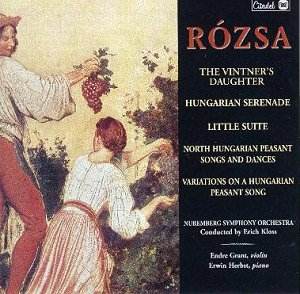Miklós RÓZSA
(1907-1996)
The Vintner's Daughter; Hungarian Serenade; North Hungarian Peasant Songs
and Dances; Little Suite (for violin and piano); Variations on a Hungarian
Peasant Song (for violin and piano).
Endre Grant (violin) and Erwin Herbst (piano)
 Nuremburg Symphony Orchestra
conducted by Erich Kloss
Nuremburg Symphony Orchestra
conducted by Erich Kloss
 CITADEL CTD 88139
[62:21]
CITADEL CTD 88139
[62:21]
[24bit digital transfer reissues from original LP analogue material
originally released in 1958 and 1973]

How nice to hear some non-film music by one of the great pioneer composers
of original scores. These are excellent performances, played with considerable
spirit and élan and splendidly refurbished, that can stand up against
any competitive recordings.
Rózsa's Hungarian Serenade was originally composed in 1931
but it is the composer's 1946 revision that is heard here. In style, the
work is a charming balance between an 18th century divertimento and a modern
suite graced by delightful melodies and rhythms inspired by, but not actually
quoting from, native Hungarian music. It gives the impression of having been
scored for a huge orchestra but it is a tribute to Rózsa's skill that
this impression is created by the adroit use of rich polyphony and a winning
transparency using only a modest-sized ensemble. Its premiere was attended
by Richard Strauss who led the applause and helped the budding composer on
his way. The parry and thrust of the heroic swagger of the Marcia
opening movement would grace any Hollywood swashbuckler, and there is also
much engaging humour. The following Serenata is sweetly melancholic
and nostalgic with those very typical Rózsa sinuous twisting figures.
The Scherzo is cheerful, quicksilver and puckish with a sentimental seam
- again this would make admirable film music. The Notturno is a
starlit pastoral scene while the high-stepping Danza brings the work to a
brilliant exuberant conclusion.
The Vintner's Daughter is another light-hearted, melodic work.
Rózsa originally conceived it for piano in 1952, then orchestrated
it in 1955. When Eugene Ormandy saw the sketches he requested the right to
premiere the work with the Philadelphia Orchestra the next year. The work
is a set of 12 variations on an old French folksong which tells the tale
of a Vintner's beautiful daughter who dreams of three gallant knights falling
in love with her. Immediately, one recognises the stylistic influence of
Róza's compatriot Kódaly (in fact his Háry
Janós is more or less quoted). The influence of Debussy and Ravel
is also apparent. The work is a brilliant tour-de-force and an object
lesson in orchestration; its vivid colour and excitement achieved with a
standard orchestra not stiffened by batteries of exotic percussion. The work
also sounds very French and is further tribute to Róza's uncanny skill
in evoking period and place.
Rózsa's North Hungarian Peasant Songs and Dances is his 1950s
orchestration of his Little Suite composed (together with his
Variations on a Hungarian Peasant Song) in the 1920s for piano and
violin. So here we have the opportunity of hearing both versions of this
vibrant music that combines warmly nostalgic music with swiftly-paced,
strongly-rhythmic material. Each has its strengths but Róza's thrilling
orchestrations serve the stirring tunes very well. Finally, the other the
virtuoso piece for violin and piano, the vibrant gypsy rhythms of
Variations on a Hungarian Peasant Song are also superby realised
by Grant and Herbst.
Ian Lace

